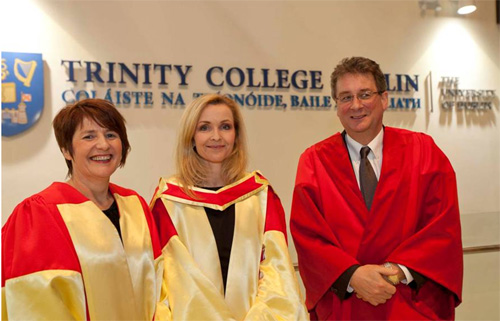Inaugural Lecture of Professor of Child and Adolescent Psychiatry, Louise Gallagher
Posted on: 01 December 2011
Professor of Child and Adolescent Psychiatry, Louise Gallagher gave her inaugural lecture on ‘Genes, Family, Time and Place: The Future Challenges for Child Psychiatry’ on November 30th, 2011 last. The following are extracts from the lecture:
Childhood often thought of as a carefree time of innocence and yet the reality is that one in five children has mental health difficulties; one in twenty have ‘serious emotional disturbance’ impacting significantly on ability to engage in developmentally normal activities. Contrary to common belief, mental health problems in childhood are not transient or benign, they frequently persist into adult life, with disability compounded by a lifetime of missed milestones and opportunity. Addressing mental ill health could be the final frontier in science and medicine. The challenge is to understand the interface between biology and environment, how multiple factors produce abnormal brain processes and debilitating mental conditions and how to most appropriately prevent or treat these conditions. Nowhere is the complexity greater than during childhood when temperament, relationships, environment and the developmental trajectory converge, navigating the developing brain through critical developmental milestones.

Professor Mary McCarron, Dean of the Faculty of Health Sciences, Professor Louise Gallagher, and Professor Dermot Kelleher, Head of School of Medicine and Vice Provost for Medical Affairs at Trinity College Dublin.
Ironically, the most severe neurodevelopmental disorders such as autism are helping to unpick the underlying complexity of brain development and how it can all go wrong. The genome era has been productive in part, providing evidence for rare genetic causes of autism and implicating underlying biological pathways. Technological advances in other fields such as neuroimaging are also providing converging support for mechanisms that may be implicated. Relationships between basic molecules, systems and their associated functioning are not linear however and require the consideration of less concrete constructs, such as environmental factors, the dynamics of interpersonal relationships and the developmental trajectory. This will require more collaboration, greater inter-disciplinary co-operation, embracing the current trend for ‘big science’. Conversely, studies highlighting the role of rare genetic factors are pushing us back to the cottage industry of science and medicine, the single case report and case series, demonstrating that it can at times be possible to have meaningful findings without a big p-value.
Recent developments emphasise the long articulated need for constant interaction between lab and clinic to translate science into clinical solutions. This has been exemplified in the case of Rett syndrome, a rare neurodevelopmental disorder with a known genetic cause. Identification of key neurobiological pathways in Rett syndrome led to the identification of drug targets. This extraordinary development has not been lost on big Pharma who are now falling upon autism as the next big opportunity for drug development, as seen in initiatives such as the Innovative Medicines Initiative. But there is still a lot that needs to be understood.
Understanding complex problems frequently needs big investment. Given current economic constraints there is a tendency to favour the use of cutting edge technologies to solve complexity, neglecting less glamorous fields such as epidemiology and clinical studies. But there is no ‘either, or’ solution. Moreover, it is also easier to neglect the needs of children during difficult times, and easier still those with disability. Children with mental health disorders deserve better treatment. They deserve to have their conditions recognised, treated and even better prevented and they need us to advocate for them.
About Professor Lousie Gallagher
Louise Gallagher (MB MRCPsych PhD) is a child psychiatrist and Professor of Child and Adolescent Psychiatry at Trinity College Dublin. She went to school in the Liberties and went on to study Medicine in University College Dublin in 1994. She was always fascinated by the brain and how it worked, having witnessed the cognitive decline of her grandmother, with whom she was very close with dementia. An education in Ireland in the 1970s left her with the memory of corporal punishment administered to children with learning difficulties in school, prompting her interest in neurodevelopment and advocacy for children. She completed psychiatry training in the Dublin University (TCD) training scheme in psychiatry in 2000.
She developed an interest in autism genetics during her training in psychiatry. She was awarded a Wellcome Trust Fellowship in 2000 to pursue a PhD in psychiatric genetics, on ‘Molecular Genetics of Autistic Spectrum Disorders’ from TCD in 2004. She developed an autism research group who are actively engaged in understanding the autism phenotype, underlying genetic susceptibility and the neurobiology of ASD. Her group is engaged in a range of molecular genetic approaches and functional and structural neuroimaging. She is a member of the Autism Genome Project and led the development of the AGP Simplex Collection (TASC), a biological sample collection recruited through 12 international sites that is housed at the NIMH repository.
From 2005-2010, Louise was a Consultant Child and Adolescent Psychiatrist in the St. James’s Hospital/ Clondalkin area. Louise is now the Consultant Child and Adolescent psychiatrist in Beechpark autism services in Dublin and surrounding areas.
